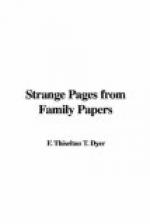Such cases, it is true, have been somewhat rare, for made oftentimes on the impulse of the moment, “unheedful vows,” as Shakespeare says, “may heedfully be broken.” But, scarce as the records of unbroken vows may be, they are deserving of a permanent record, more especially as the direction of their eccentricity is, for the most part, in itself curious and uncommon. Love, for instance, has been responsible for many strange and curious vows in the past, and some years ago it was stated that the original of Charles Dickens’s Miss Havisham was living in the flesh not far from Ventnor in the person of an old maiden lady, who, because of the maternal objection to some love affair in her early life, made and kept a vow that she would retire to her bed, and there spend the remainder of her days. It was a stern vow but she kept her word, “and the years have come and gone, and the house has never been swept or garnished, the garden is an overgrown tangle, and the eccentric lady has spent twenty years between the sheets.” But whether this piece of romance is to be accepted or not, love has been the cause of many foolish acts, and many a disappointed damsel, has acted in no less eccentric a fashion than Miss Havisham, who was so completely overcome by the failure of Compeyson to appear on the wedding morning that she became fossilised, and gave orders that everything was to be kept unchanged, but to remain as it had been on that hapless day. Henceforth she was always attired in her bridal dress with lace veil from head to foot, white shoes, bridal flowers in her white hair, and jewels on her hands and neck. Years went on, the wedding breakfast remained set on the table, while the poor half demented lady flitted from one room to another like a restless ghost; and the case is recorded of another lady whose lover was arrested for forgery on the day before their marriage was to have taken place. Her vow took the form of keeping to her room, sitting winter and summer alike at her casement and waiting for him who was turning the treadmill, and who was never to come again.
On the other hand, vows have been made, but persons have contrived to rid themselves of the inconveniences without breaking them, reminding us of Benedick, who finding the charms of his “Dear Lady Disdain” too much for his celibate resolves, gets out of his difficulty by declaring that “When I said I would die a bachelor, I did not think I should live till I were married.” Equally ludicrous, also, is the story told of a certain man, who, greatly terrified in a storm, vowed he would eat no haberdine, but, just as the danger was over, he qualified his promise with “Not without mustard, O Lord.” And Voltaire, in one of his romances, represents a disconsolate widow vowing that she will never marry again, “so long as the river flows by the side of the hill.” But a few months afterwards the widow recovers from her grief, and, contemplating matrimony, takes counsel with a clever engineer.




